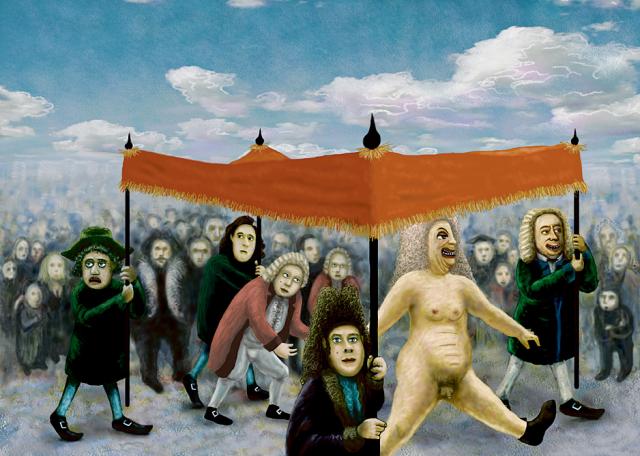Search
Democracy Links
Member's Off-site Blogs
buck naked ...

There have been two remarkable admissions from the government in the past 48 hours. Together, they indicate the trouble in which Turnbull and co find themselves.
It’s not the sort of trouble we’ve become accustomed to in Australian politics, the overly exciting sort involving constitutional crises and leadership instability. It’s a woollier, cloudier type of trouble, the type that indicates the government is stuck, not so much in quicksand but in a particularly thick type of mud.
Today, Treasurer Scott Morrison spoke to 2GB’s Ray Hadley about the GST. One of the questions that recently started to surface around the tax debate is “What is the problem the government is trying to solve?” It’s an important question, because it gets to deep ideological questions about what the current federal government believes its role is, and what the most vexing questions facing the country are.
Morrison answered that question very clearly and simply today: “The only reason we were looking at [GST] issues and continue to investigate those is because it gives the only opportunity there really is for very big income tax cuts.”
That’s it: the government’s sole purpose for tax reform, according to the man in charge of the nation’s economic policy.
Income tax cuts are a legitimate goal. And bracket creep is a problem. But as every man, woman and their dogs have recently pointed out, wage growth is very slow right now, and bracket creep less of a problem than at other times.
In any case, delivering income tax cuts is not reform. It does not change anything systematic in the national economic framework. It is a temporary measure to provide taxpayers with relief. Useful, but not structurally significant, not visionary, not imaginative, and certainly not brave.
So it is a little worrying that the treasurer has reduced the government’s economic policy ambitions to this single temporary measure.
The second remarkable admission, also on the GST, came from the only boss the treasurer has, Malcolm Turnbull. After insisting that “it's not a question of politics here”, and “it's not going to be a political decision”, the PM went on to tell the ABC’s Barrie Cassidy that:
This is a very thorough evidence-based examination, and Barrie, I’m not going to pretend that at the end of that process you’ve [not] got to make some practical political decisions. You know, you can have the best idea, best policy in the world but if you can’t persuade people to accept it, then it’s not going to fly.
Also: “You have got to first decide: is this policy going to give you the economic outcome you want? Then you have to assess the practical politics.”
So it seems that what the PM is saying is that the decision on the GST will not be political, until such time as it is.
On the one hand, it’s a refreshingly honest admission from a political leader. The public knows well that politics enters into these decisions and refusing to concede as much invites perceptions of insincerity. Turnbull promised us intelligent and honest talk and, in this interview, once he’d got past contradicting himself a couple of times, duly delivered it.
But it’s also worrying that a new and popular prime minister, facing an opposition party fresh from years of leadership chaos, is making such a song and dance about political challenges. It seems at odds with the boldness that Turnbull emanated as a minister. There are, as Turnbull has pointed out, good reasons not to proceed with a GST. But at this stage in his prime ministership the politics are not one of them.
Unwittingly, Turnbull and Morrison have done their best to give new currency to the question that has been gaining some ground among commentators, and that Labor has been trying to introduce into the political debate since Turnbull became PM: what does Turnbull actually believe in?
The nation’s new emperor is rapidly being stripped of all his former clothes: the GST, the republic, climate change, and same-sex marriage. What is left?
This is not yet a political problem, and won’t be for some time. The combination of the PM’s articulateness, memories of Labor, Shorten’s failure to inspire, and income tax cuts should be enough to sustain a Liberal election victory this year.
But it is a problem for Australia. We should all be hoping that Malcolm Turnbull, lying in his bed at night all these many years and dreaming of the prime ministership, hoped to do more than deliver some tax cuts which will vanish in a few years anyway. We should hope this very much indeed.
- By John Richardson at 8 Feb 2016 - 7:08pm
- John Richardson's blog
- Login or register to post comments
Recent comments
3 hours 48 min ago
4 hours 46 min ago
4 hours 54 min ago
5 hours 2 min ago
7 hours 25 min ago
8 hours 47 min ago
10 hours 39 min ago
1 day 4 hours ago
1 day 6 hours ago
1 day 7 hours ago